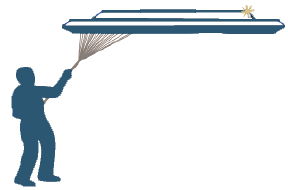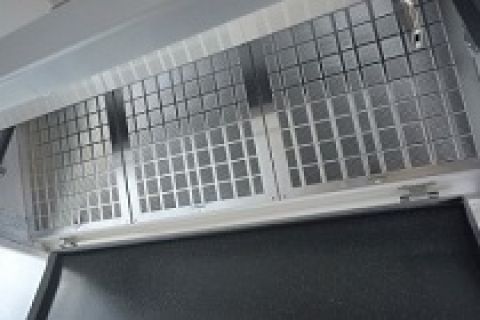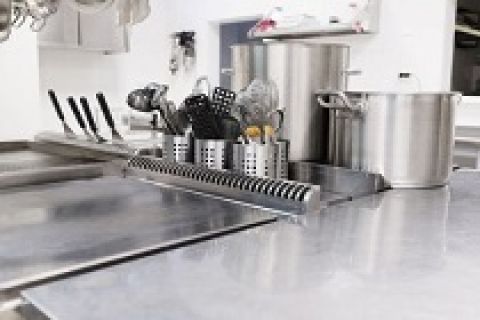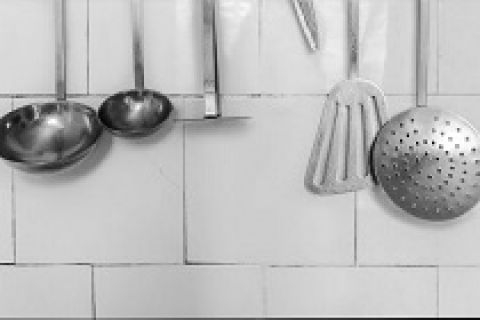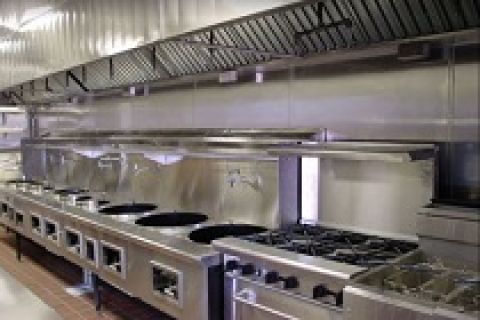The Environmental Impact of Professional Kitchen Cleaning Services
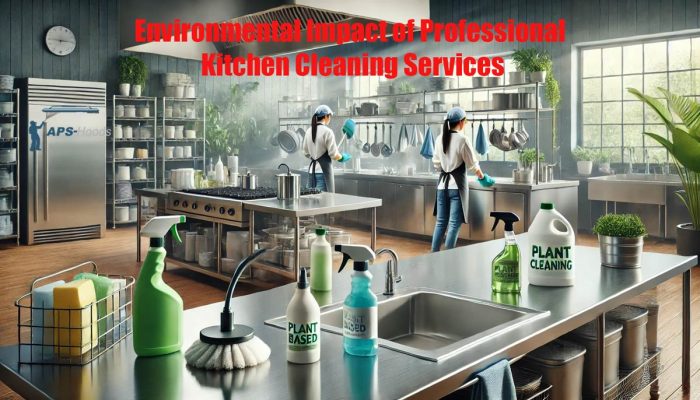
The environmental impact of professional kitchen cleaning services has become a hot topic in today’s world where sustainability is at the forefront of global conversations.
Commercial kitchens, with their fast-paced operations and strict cleanliness rules, often use a variety of cleaning products and methods that can affect the environment. Traditional cleaning practices can add to pollution and drain our resources from chemical runoff to excessive water usage.
However, as awareness grows, many cleaning services are now switching things up with eco-friendly methods and products, aiming to reduce their carbon footprint while keeping hygiene standards.
In this article, we will dive into how these kitchen cleaning services affect the environment and check out some cool, innovative approaches that balance cleanliness with caring for our planet.
At APS-Hoods, we offer you professional kitchen cleaning services. Don’t hesitate to call 800-750-7313 for more information.
Understanding the Environmental Footprint of Commercial Kitchens
Commercial kitchens are the backbone of the food service world, but they can also leave quite a mark on the environment. Here’s a breakdown of the key factors helping to this impact:
1. Water Usage
These kitchens use tons of water for cooking, cleaning, and preparing food.
Besides, if things aren’t run efficiently, you can end up wasting a lot, especially when washing dishes or cleaning equipment.
2. Energy Consumption
Ovens, stoves, fridges, and dishwashers use large amounts of energy. Also, many kitchens operate during peak hours, leading to increased energy demand, which isn’t good for local power supplies.
3. Waste Generation
A lot of food is discarded because of over-preparation or spoilage. Moreover, non-recyclable packaging adds to the trash problem.
4. Chemical Use
Cleaning Products: Many kitchens rely on strong chemicals to keep things clean, which can lead to pollution. If not handled right, these chemicals can be risky for both workers and customers.
5. Carbon Emissions
Getting ingredients delivered adds to greenhouse gas emissions. Also, some cooking styles (like grilling or frying) can produce more emissions than others.
Eco-Friendly Cleaning Products
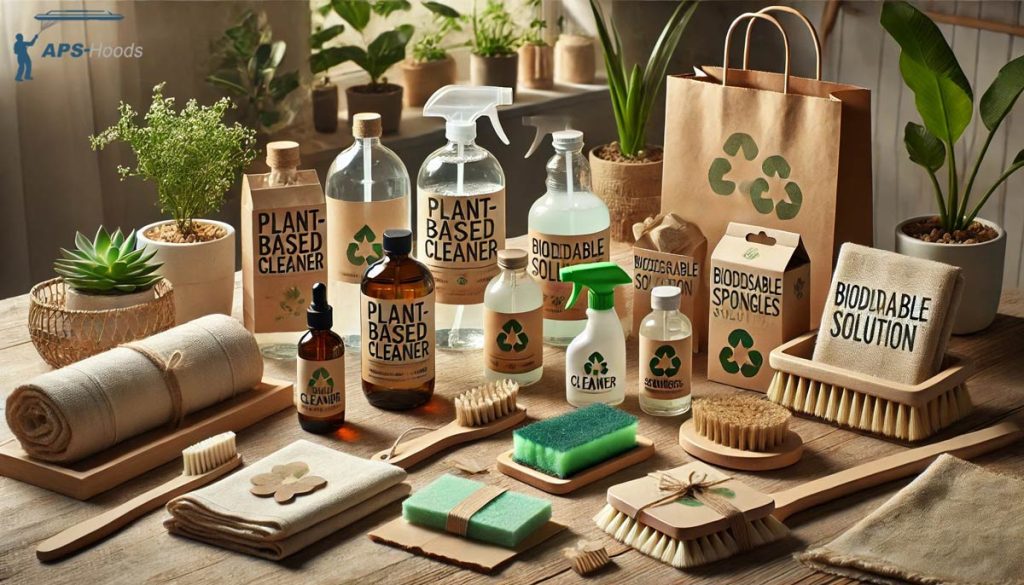
- Vinegar
It is great for disinfecting, deodorizing, and cutting grease. Vinegar is non-toxic, biodegradable, and effective against bacteria.
- Baking Soda
Excellent for scrubbing surfaces, deodorizing, and unclogging drains. This gentle abrasive is safe for most surfaces, and it neutralizes odors.
- Castile Soap
This all-purpose soap is used for washing dishes, and floors, and even as a body wash. It is made from vegetable oils. It is free from synthetic ingredients and biodegradable.
- Lemon Juice
A kind of natural bleach, deodorizer, and stain remover. It has antimicrobial properties and a fresh scent.
- Essential Oils
You can add them to homemade cleaners for fragrance and antibacterial properties (e.g., tea tree oil, and lavender oil). They have natural scents and potential antibacterial effects.
- Hydrogen Peroxide
It is used for disinfecting surfaces and whitening laundry. Hydrogen Peroxide breaks down into water and oxygen, making it eco-friendly.
- Cornstarch
This can be used to clean windows, polish furniture, and as a carpet cleaner. Cornstarch is non-toxic and biodegradable.
- Olive Oil
This oil is great for polishing wood and furniture. It is natural and adds shine without harmful chemicals.
- Commercial Eco-Friendly Brands
Look for brands that offer products made from plant-based ingredients and are free from harsh chemicals.
Tips for Using Eco-Friendly Cleaners
Many natural cleaners can be diluted with water to increase efficiency and reduce waste.
Store homemade cleaners in labeled glass or recycled containers to avoid chemical reactions.
Always test a small area first to ensure compatibility with the surface you’re cleaning.
By choosing eco-friendly cleaning products and using them efficiently, we can keep a clean environment while reducing our impact on the planet!
Water Usage
Did you know farming uses about 70% of all our freshwater? Finding smarter ways to water crops can save a ton of water.
Factories need water for all sorts of stuff like making products, cooling things down, and cleaning up. Using less water can cut costs and help the planet.
We use water at home for cooking, cleaning, showering, and watering plants. Being aware of how much we use can help save it.
When we waste water, we hurt ecosystems since taking too much water can mess with habitats and wildlife.
Many places are running low on water because of overuse and climate change, which affects lots of people.
Moreover, treating and moving water takes energy, so using less can lower energy consumption too.
Ultimately, to save some water, fix those leaks first. A dripping faucet or a leaky toilet can waste gallons of water every day; so, get those fixed!
Secondly, you can swap out your showerheads and faucets for low-flow versions. They work great and save water.
Thirdly, go for water-efficient dishwashers and washing machines that use less water per load.
Fourthly, try drip irrigation systems or collect rainwater to water your garden.
Fifthly, pick plants that don’t need a lot of water.
Sixthly, cut down your shower time. This can save a bunch of water.
Seventhly, instead of letting the water run while washing dishes, fill up the sink or use the dishwasher when it is full.
Eighthly, you can also set up some rain barrels to catch rainwater for your plants.
Waste Management Practices in Kitchen Cleaning: Reducing, Reusing, Recycling
1. Reducing Waste
Before going to the grocery store, plan your meals for the week. This helps avoid buying too much and reduces food waste.
Purchasing items in larger quantities can minimize packaging waste. Just make sure you can use them before they go bad!
Instead of paper towels, use reusable cloth towels for cleaning. They are more durable and cut down on paper waste.
Finally, use cleaning products that come in minimal or recyclable packaging.
2. Reusing Items
Use glass jars or old containers to store leftovers or organize pantry items. They are perfect for reducing single-use plastics.
If you have vegetable peels or coffee grounds, consider composting them instead of throwing them away. Such a great way to enrich your garden soil!
Also, instead of buying disposable cleaning pads, use old t-shirts or towels as rags for dusting and scrubbing.
3. Recycling Properly
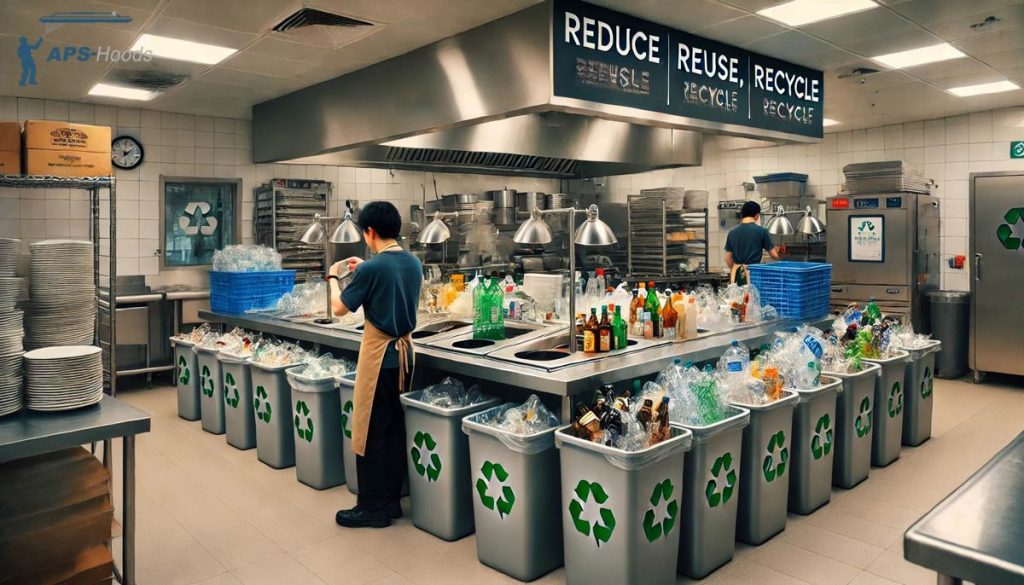
Get to know what can be recycled in your area. This can include cardboard, certain plastics, and glass.
Rinse out containers to avoid contamination, which can make recycling more effective.
Many food packages can be recycled, like cereal boxes and some plastic containers. Just check the recycling symbols!
4. Bonus Tips
Make your cleaning solutions using lemon juice, vinegar, and baking soda. It’s cost-effective and reduces the need for chemical cleaners.
Moreover, share what you know about reducing, reusing, and recycling with family and friends. The more people who get on board, the bigger the impact!
The Role of Energy Efficiency in Professional Kitchen Cleaning Services
1. Saving Money
Using energy-efficient cleaning tools means you will spend less on electricity and water, which is always a win. Besides, these tools usually wear out less quickly, so you won’t have to replace them as often.
2. Helping the Planet
When you use less energy, you are cutting down on carbon emissions, which is great for the environment. Moreover, efficient cleaning methods often use way less water, which is very important in places where water is scarce.
3. Better Cleaning Results
Energy-efficient equipment often has the latest technology, so it cleans better while using less power. Many of these machines dry surfaces faster, so kitchens can get back to business sooner.
4. Staying Compliant
Lots of places have energy use regulations. Going for energy-efficient practices helps you stay in the clear.
Besides, if you focus on being energy-efficient, you might qualify for some eco-friendly certifications that make you look good to clients.
5. Happy Employees
Energy-efficient tools are usually quieter and cooler, making it a nicer place for your cleaning crew to work. Also, many modern energy-efficient machines come with better safety features, which means fewer accidents on the job.
6. Attracting and Keeping Clients
Many businesses care about sustainability. Offering energy-efficient cleaning can help you stand out and attract clients. Moreover, clients love working with companies that care about the planet, so they are more likely to stick around.
The Impact of Chemical Cleaners on Air Quality and Health
A lot of cleaning products let off VOCs which can float around in the air. These include stuff like formaldehyde and benzene. The VOCs can mess with your lungs, especially if you have asthma or allergies. You might find yourself coughing or feeling short of breath. Also, some VOCs are neurotoxic and can cause headaches or dizziness.
Moreover, when you spray cleaners, tiny particles can get released into the air. The particles can hang around and cause breathing problems.
Mixing different cleaners can create some dangerous stuff (think bleach and ammonia creating chlorine gas). This can make the air even worse and be super risky.
A lot of these cleaners can irritate your skin or eyes if you’re not careful. Prolonged use could lead to rashes or allergic reactions.
Also, some chemicals can throw off your hormones, which isn’t good for anyone.
Finally, chronic exposure to certain chemicals has been linked to serious health problems, such as cancer.
To stay safe, try using eco-friendly cleaners that skip the harmful chemicals. You can even whip up your cleaners with vinegar, baking soda, and essential oils!
Moreover, ensure to open windows or turn on fans when you are cleaning. Fresh air helps clear out the bad stuff.
Wear gloves, masks, and goggles when using harsh cleaners. Better safe than sorry!
You can talk to friends and family about the risks of chemical cleaners. Encourage them to check labels and know what they are using.
At last, get behind rules that limit harmful chemicals in cleaning products and push for clearer labels so everyone knows what they are buying.
If you need any professional kitchen cleaning services, then team up with us at APS-Hoods.
Frequently Asked Questions on Professional Kitchen Cleaning Services
1. What Does Professional Kitchen Cleaning Services Include?
A professional kitchen cleaning service typically includes deep cleaning of all surfaces, equipment, and appliances. This may involve cleaning ovens, grills, fryers, hoods, countertops, floors, and walls. They may also sanitize utensils and dishware.
2. How Often Should I Use Professional Kitchen Cleaning Services?
The frequency of professional cleanings depends on usage. For commercial kitchens, it is often recommended to have a deep clean every 3-6 months. Residential kitchens may need less frequent cleaning, perhaps once or twice a year, depending on cooking habits.
3. Are the Cleaning Products Used Safe for Food Preparation Areas?
Reputable and professional kitchen cleaning services use food-safe and non-toxic cleaning products. Always ask about the products used to ensure they meet health and safety standards.
4. Will the Cleaning Service Move My Appliances?
Most professional services will move appliances as needed to clean behind and underneath them. However, it is best to confirm this with the service provider beforehand.
5. Do I Need to Be Present During the Cleaning?
You don’t need to be present during the cleaning, but you should ensure that the cleaners have access to the kitchen. Some clients prefer to be there for any specific instructions or concerns.
Do you have issues with cleaning operations? We are here in Denver, CO. Dial 800-750-7313 and let us help.
Enjoy APS-Hoods’ Professional Kitchen Cleaning Services in Denver, CO.
In conclusion, the environmental impact of professional kitchen cleaning services is something we should think about. While these services are important for keeping things clean and safe, they can also have some downsides, like using harsh chemicals, wasting water, and consuming a lot of energy.
The good news is that many cleaning companies are starting to go green by using biodegradable products, saving water, and being more energy-efficient. By focusing on eco-friendly practices, they can clean effectively without hurting the planet as much.
So, when you are looking for professional kitchen cleaning services, it is a smart move to pick APS-Hoods which cares about the environment. It is a win-win for both your kitchen and the planet!
Tags: Commercial Kitchen Cleaning, eco-friendly kitchen cleaning
